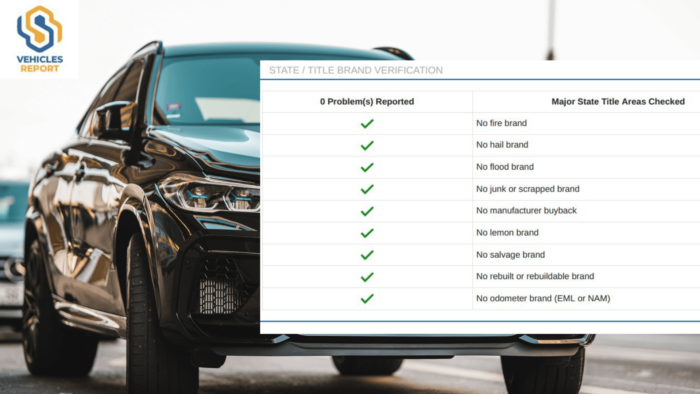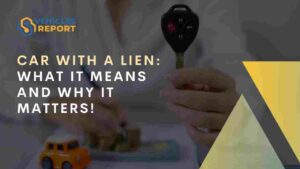Have you ever bought a car from a dealer who attested that the car has a clean vehicle history report or VIN report? Then you went ahead to buy the car with confidence, never suspecting anything.
There is a huge problem with just seeing the vehicle history report. Some of these vehicles have been damaged, bought by a dealer, fixed and sold again to potential clients. The issue is that a dealer will never tell you about the accident, but just that it has a clean vehicle history report.
If a vehicle has a clean vehicle history report, it means the vehicle has a clean car title and no major issues have been reported about the car, including the lien and loan title. No flooding or fire has occurred, no salvage, rebuild, or recall from the National Highway Traffic Safety Administration (NHTSA).
What's Included in a Vehicle History Report?
For car dealerships, it’s very important to have clean vehicle history reports in order to maximize the trade-in value of the cars on sale.
A clean vehicle history report will contain information about a vehicle’s sustained damage and accident history, odometer history, any car titles, any lemon status, Service and maintenance records, Number of previous owners, safety recalls, etc.
What Goes into a Vehicle History Report?
A vehicle history report can either make or break a deal. With the VIN number, one can retrieve records from several databases, and compile the available information into a document format that can be downloaded online.
Some of the information that you can find using the VehiclesReport Vin check service include:
1. Damage and Accident History
A used vehicle with a neat body doesn’t guarantee it hasn’t suffered from any damage before. This could be anything from a minor accident to other serious damage that the car has been involved in since its first use.
For instance, there is a possibility of the airbags being deployed, and you will see this in the VIN report. It’s unlikely you would want to buy a vehicle that has once been deemed a total loss due to a collision.
2. Odometer History
To verify accurate mileage, VehiclesReport can provide information on the vehicle’s odometer. It’s very easy to alter the mileage of a manual odometer, unlike the digital odometer, although it’s still very possible.
This becomes an issue because a buyer would think that a vehicle is less used than it actually is, and is likely to overpay for the car.
3. Title Issues
A vehicle’s title validates the ownership. So if the certificate of title is missing or there are issues with it, your best option may be to walk away.
Avoid buying from a private seller who can’t prove that they own the vehicle.
4. Lemon Status
A lemon status is attributed to vehicles that have been recalled or repurchased because of major issues. This could be an honest reason why you should not purchase a vehicle that’s been rebuilt because of potential future issues.
5. Records of Previous Owners
It’s always a good feeling knowing how many owners have possessed a vehicle. For a rental car, for instance, you may not have any idea of how many people have been driving it, the kind of stress they have put on the vehicle, and how clean it’s been.
A personal car with fewer owners, especially one with a good maintenance record, indicates that the vehicle might be a better investment in the end.
6. Service or Maintenance Records
A vehicle with a regular maintenance record should give you records of oil changes, tire rotations and routine checkups performed across the years.
These records can provide insight into any issues the vehicle might have developed in the past and if they’ve been addressed or not.
7. Warranties Status
Depending on the age of a used vehicle, VehiclesReport is able to tell you if there are any valid warranties.
In instances where the car is under warranty, some maintenance can be covered and this could make the difference in your decision to buy the used vehicle.
8. Safety Information
VehiclesReport can also provide crash-test information on the specific make and model of the vehicle. Included in this category are the safety recalls and other relevant safety information.
Knowing about the safety information of a vehicle can assure the potential buyer additional peace of mind on the road.
VehiclesReport: A Perfect Carfax Alternative for a Vehicle History Report
Carfax is known to be the most trusted vehicle history service provider among all the available VIN history services. But it has a major setback in that they are expensive and don’t offer an OEM window sticker service.
VehiclesReport is a direct competitor and excellent Carfax Alternative.
While they both provide the same information from similar databases, VehiclesReport is cheaper and includes in their report, the auction information and the photos of the cars in auction.
VehiclesReport have the cheapest offer for bulk reports from 50 and up whereas a single report costs only $25.
VehiclesReport utilizes Insurance Database, NMVTIS database, DMV databases, world auction databases, and over 60 more data points to compile one of the most accurate and comprehensive vehicle history reports for the automotive industry.
VehiclesReport is also a perfect Carfax alternative by offering window stickers, just like the Monroney stickers.
The window sticker would tell you information about the year, make, and model, the manufacturer’s suggested retail price (MSRP), the standard equipment and optional features, engine details, fuel economy ratings, safety ratings, and crash-test scores, and warranty information. Carfax doesn’t offer this service.
The information in the window sticker can be very helpful when comparing vehicles to decide on the right one for you. For instance, the window sticker, also called a build sheet, may tell you that one Toyota Highlander comes with a cold-weather package like a heated steering wheel and seats, while another one doesn’t.
So if you reside in a snowy climate region, this additional information may help you narrow down your options.
How to Determine if a Vehicle has a Clean Title
Let’s start with what you know. The easiest way to know if a vehicle has a clean title is to locate the certificate of title, which your dealer should have given to you when you bought the vehicle. If stated in the certificate that it’s clean, then that is all you need for the verification.
However, if the vehicle title is not found or you have questions about the authenticity of the one you’re given by your dealer, you can simply employ other methods to verify the state of the vehicle title.
An easy and surefire way to prove that your vehicle has a clean title is to locate the vehicle identification number (VIN) and conduct a vehicle history check to get the VIN history.
You can also do this by simply contacting the Department of Motor Vehicles (DMV) in your state and providing them with the car’s VIN, make, model, and year. With this, they will likely be able to offer you the vehicle history report, which also includes the type and state of the vehicle title.
A Car has a Clean Vehicle History Report. What Next?
You need to have the vehicle inspected. It’s as simple and short as that!
Just because you have a clean vehicle history report doesn’t mean that the vehicle has not had problems in the past.
Interestingly, some dealers who are providing clean vehicle history reports have been reported to be using them in court to defend themselves against any charges that they were aware a vehicle was damaged when they sold it. There are also cases of dealers who alter vehicle history reports that indicate problems.
So before you buy a used car, it’s better you take your mechanic along to have it checked for any evidence of damage.
Conclusion
Remember that even clean vehicle history reports don’t guarantee that the vehicle has not been smashed or doesn’t have other problems.
To know a vehicle’s history, you must get the VIN report to know if it has clean titles or not. So the next time you’re on Craigslist or any car classified sites, ask the seller for the VIN number and then utilize our VIN check tool to avoid the issues that come with buying used cars.
Don’t forget to check our latest blogs at vehiclesreport.com.








